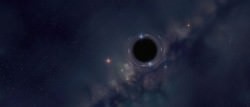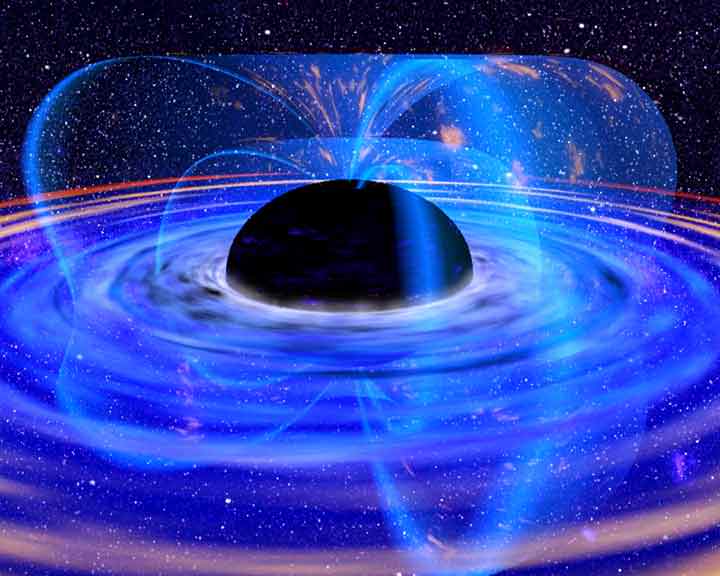[/caption]
As you are likely aware, there are numerous ways in which the Universe could kill us all, destroying the Earth and whatever signs of human life, or life in general, existed on our planet. Gamma Ray Bursts, Coronal Mass Ejections, or just the odd asteroid or comet slamming into the Earth would easily take out most of the life on our planet. But, what about black holes? Do we have to worry about them, too? Could a black hole wipe out all life on Earth, sucking us all into oblivion? It’s possible, but not very likely. And by not very likely, it’s calculated that the odds of being killed by a black hole are about one in one trillion.
First, a black hole has to get to the Earth. There are two ways of this happening. The first is that we create one ourselves, the second that a black hole wandering the galaxy happens upon our little Solar System, and meanders in towards the Sun. We’ll start with the first scenario: creating our own destruction.
How could we make our own black hole? Well, theoretically, when you slam protons together with enough force, there is the potential for the creation of a small, short-lived black hole. Particle colliders like the Large Hadron Collider in Geneva, Switzerland, which is scheduled to start operating again in November 2009, could potentially create miniscule black holes through the collisions of protons. There were many headlines from the mainstream media about the potential of the LHC to create runaway black holes that would find their way to the center of the Earth and devour it from the inside, causing, “total destruction.” Sounds scary, doesn’t it? Even more, two people were suing to stop the LHC because of the potential hazard they thought it posed.
However, the LHC is in no way going to destroy the Earth. This is because any black holes created by the LHC will almost instantly evaporate, due to what’s called Bekenstein-Hawking radiation, which theorizes that black holes do indeed radiate energy, and therefore have a limited lifespan. A black hole with the mass of, say, a few protons, would evaporate in trillionths of a second. And even if it were to stick around, it wouldn’t be able to do much damage: it would likely pass through matter as if it didn’t exist. If you want to know whether the LHC has destroyed the Earth, go here.
Of course, there are other ways of creating black holes than the LHC, namely cosmic rays that slam into our atmosphere on a regular basis. If these are creating mini-black holes all of the time, none of them seem to be swallowing the Earth whole…yet. Other scientific experiments also aim at studying the properties of black holes right here on Earth, but the danger from these experiments is very, very minimal.
Now that we know black holes created here on Earth aren’t likely to kill us all, what about a black hole from the depths of space wandering into our neighborhood? Black holes generally come in two sizes: supermassive and stellar. Supermassive black holes reside in the hearts of galaxies, and one of these is not likely to come barrelling our way. Stellar black holes form from a dying star that, in the end, gives up its fight against gravity and implodes. The smallest black hole that can form from this process is about 12 miles across. The closest black hole to our solar system is Cygnus X-1, which is about 6,000 light years away, much too far to pose a threat by muscling it’s way into our vicinity (although there are other ways that it could potentially harm us if it were closer, like blasting us with a jet of X-rays, but that’s a whole other story). The creation process for a black hole of this variety – a supernova – could potentially sling the black hole across the galaxy, if the supernova happened in a binary pair and the explosion was asymmetric.
If a stellar black hole were to plow through the Solar System, it would be pretty ugly. The object would likely be accompanied by an accretion disk of heated, radioactive matter that would announce the presence of the black hole by frying our atmosphere with gamma and X-rays. Add to that the tidal forces of the black hole disrupting the Sun and other planets, and you have a huge mess on your hands, to say the least. It’s possible that a number of planets, and even the Sun, could be flung out of the Solar System, depending on the mass, velocity, and approach of the black hole. Yikes.

There lies one last possiblity for black holes to wreak their havoc on the Earth: Primordial Black Holes. These are miniature black holes theorized to have been created in the intense energies of the Big Bang (which the LHC plans to mimic on a MUCH smaller scale). Many of them most likely evaporated billions of years ago, but a black hole that started out with the mass of a mountain (10 billion tons) could potentially still be lurking around the galaxy. A hole of this size would shine at a temperature of billions of degrees from Bekenstein-Hawking radiation, and it’s likely we would see it coming due to observatories like NASA’s Swift.
From a few yards a way, the black hole’s gravity would be barely noticeable, so this kind of black hole wouldn’t have an effect on the gravity of the Solar System. At less than an inch, though, the gravity would be intense. It would suck up air as it passed through the atmosphere of the Earth, and start to make a small accretion disk. To such a tiny black hole, the Earth seems close to a vacuum, so it would probably pass right through, leaving a wake of radiation in its path and nothing more.
A black hole of this variety with a mass of the Earth, however, would be roughly the size of a peanut, and would be able to potentially swing the Moon straight into the Earth, depending, of course, on the trajectory and speed of the black hole. Yikes, again. Not only that, if it were to impact the Earth, the devastation would be total: as it entered the atmosphere, it would suck up a lot of gas and form a radioactive accretion disk. As it got closer, people and objects on the surface would be sucked up into it. Once it impacted the surface, it would start swallowing up the Earth, and probably eat its way all the way through. In this scenario, the Earth would end up being nothing more than a wispy disk of debris around the remaining black hole.
Black holes are scary and cool, and none of the scenarios depicted here are even remotely likely to happen, even if they’re fun to think about. If you want to learn more about black holes, Hubblesite has an excellent encyclopedia, as does Stardate.org. You can also check out the rest of our section on black holes in the Guide to Space, or listen to the multiple Astronomy Cast episodes on the subject, like Episodes 18, or the questions show on Black, Black Holes. Much of the information on the likelihood and aftereffects of a black hole collision with the Earth in this article is taken from chapter 5 in Phil Plait‘s “Death from the Skies!”
Sources: Discover Magazine, NASA

